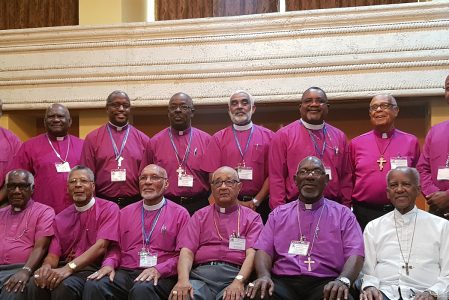… as the Gateway to Holy Communion

Church in Province of the West Indies (CPWI)
To all the faithful
The Church, as the Body of Christ, has both Word and Sacrament to nourish and sustain its members. Down through the centuries, the Church has been called to the faithful preaching of the Word and the administration of the Sacraments as part of God’s mission and witness to God’s Reign.
From about the fifth century, it became common in the western Church to separate the Sacrament of Baptism (in which a person is joined to the Body of Christ, and sacramentally with Christ’s death and resurrection) from the ceremony of Confirmation, when the bishop, as chief pastor, welcomes the newly baptised, and lays hands upon them praying for the strengthening of the Holy Spirit. From the thirteenth century, it became customary also not to admit anyone to the Sacrament of Holy Communion unless or until they had received the sacramental act of Confirmation.
Thus, three ceremonies which the early Church had held together were separated, and the pattern was established with which Anglicans are familiar (of Baptism in infancy, of Confirmation at puberty, and Communion thereafter). These developments seemed expedient at the time that they were implemented, but in so doing, a great truth was obscured: the Sacrament of Baptism, commanded by Our Lord, is in fact the whole ceremony, entire and complete in itself, by which a person is incorporated into Christ, and recognised as a Christian.
In the Church today, there are many who believe that the witness of the Church to Jesus Christ, and the process of nurturing children and young people in the Christian faith, would be immeasurably strengthened by recovering this earliest symbolism. Baptism alone should be seen as the gateway into participation in the life of the Church, including admission to the Sacrament of Holy Communion. It is our conviction that all the baptised, by virtue of their Baptism alone, are full members of the Body of Christ and qualified to receive Holy Communion.
Following the advice of the Provincial Commission on Doctrine, The House of Bishops and by Resolution #1 of the Fortieth Provincial Synod 2019, the Province will engage in a period of study in preparation for the change which will be further discussed and debated at the next triennial Synod of the Province proposed for 2022.
Of course, the proposed change will raise important questions for the life of the Church. Materials have been prepared to assist in the process which can be used in our parishes to instruct the faithful on the meaning and significance of the proposed change before any final agreement and implementation in the Province.
Re-adopting Baptism as the gateway to Holy Communion will also raise questions concerning the Rite of Confirmation. While Confirmation will no longer be the gateway to Communion, it will take its proper place in the sacramental acts of the Church as a channel of God’s grace, affirming disciples, following the public declaration of their faith, of their place in the fellowship of the Church and commissioning them, through the laying on of hands, for greater service in the Church and the world as they are empowered by God’s Holy Spirit.
We are proposing that the period of study begin in the Province by the first Sunday of Advent, November 29, 2020, or no later than the first Sunday in Lent, February 21, 2021.
We entrust the Church in the Province of the West Indies to God’s good care and grace, and pray that, as we study and acknowledge the place of all the baptised at the Eucharist, he may renew our life in him and the commission we receive to his service, so that we might all grow in grace, and bear witness to his love in the world.
The House of Bishops of the Church of the Province of the West Indies









